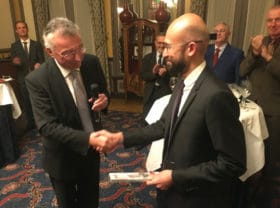ENSI Director General resigns WENRA chair
ENSI Director General Hans Wanner is resigning from his position as WENRA chairperson. His replacement is Olivier Gupta, Director General of the French Nuclear Safety Authority (ASN). The official handover occurred as part of the celebrations of WENRA’s 20th anniversary, which took place in connection with an IAEA conference in The Hague.

An international meeting of the International Atomic Energy Agency IAEA took place from 4 to 7 November 2019 in The Hague (NL). In connection with the conference, the Western European Nuclear Regulators Association WENRA held event celebrating its 20th anniversary . The main task of the association is harmonising and improving safety standards in the areas of reactor safety, decommissioning and disposal. Switzerland is represented in WENRA by ENSI.
ENSI Director General Hans Wanner has chaired the association since 2011. “In my opinion, the voluntary nature of WENRA is one of its great advantages: its members do not become members because they are obliged to be. Rather, we are all united by the drive to strengthen nuclear safety at both a European and a global level. In this context, important emerging problems are also being tackled.” After eight years, ENSI Director General Hans Wanner is now handing over the chair to the Olivier Gupta, Director of the French Nuclear Safety Authority, ASN. The official transfer took place as part of the WENRA anniversary celebrations in The Hague. Representatives of the international regulatory authorities, the IAEA and industry all participated in the event.
About WENRA
“The event provided a good overview of WENRA’s achievements so far as well as of its future challenges,” stated the outgoing Chairman Hans Wanner. “We have achieved a lot in the past few years, such as the revised safety reference levels following the Fukushima disaster”. Thus, in line with WENRA’s objectives, a harmonised concept for nuclear safety in Europe has been reinforced while reactor safety has been continuously improved.
“WENRA must remain agile and flexible”
The challenges facing WENRA are changing with the development of the European and global nuclear industry: While countries such as Switzerland are exiting nuclear power, other countries are building new nuclear power plants. Thus, on the one hand, the safety of existing nuclear power plants needs to be ensured up to and during decommissioning, while on the other hand, new technologies, such as small modular reactors, must be checked in respect of their safety. “To be able to navigate through this dynamic environment, WENRA must remain agile and flexible,” Hans Wanner stated. “I am convinced that WENRA is well equipped for the future and wish my successor, Olivier Gupta, all success in this important task.”

